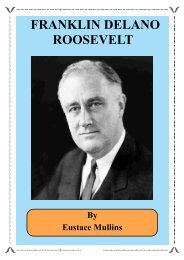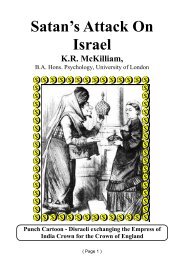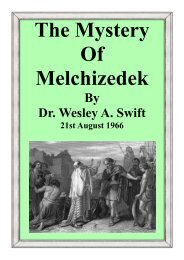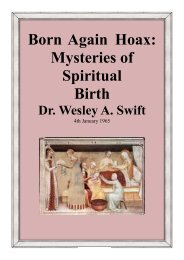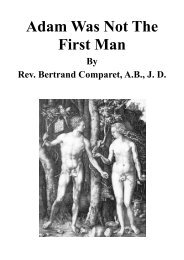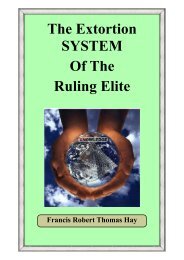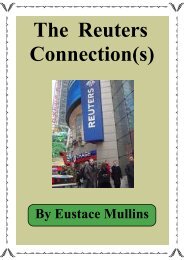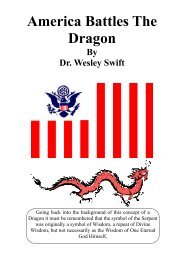Curse of Cannan - The New Ensign
Curse of Cannan - The New Ensign
Curse of Cannan - The New Ensign
You also want an ePaper? Increase the reach of your titles
YUMPU automatically turns print PDFs into web optimized ePapers that Google loves.
a successful revolt against the greatest military power in the world. As part <strong>of</strong> the Masonic<br />
conspiracy, Randolph used this spectre to foist on the convention a new constitution, which<br />
established a national legislature, a national executive, and a national judiciary, thus creating<br />
what had never been desired or envisioned by the other delegates, a supreme federal power<br />
having control <strong>of</strong> the several states.<br />
As is <strong>of</strong>ten the case with prominent Masons, Randolph's public career was marred by repeated<br />
scandals, due to his involvement with alien powers. He had become deeply involved with the<br />
Illuminati adventurer, Edmond Genet, who had been sent as the first French Ambassador to the<br />
new Republic. Genet landed at Charleston on April 8, 1793, to be enthusiastically greeted by his<br />
fellow Masons <strong>of</strong> the Charleston Lodge, the Mother Lodge <strong>of</strong> the World. Genet immediately<br />
began to act as a conquering general, issuing commissions and letters <strong>of</strong> marque to his Masonic<br />
colleagues. When he arrived in Washington, instead <strong>of</strong> presenting his credentials immediately<br />
to President Washington, as protocol required, he ignored him. Instead, Genet gave a great<br />
banquet, during which he received demonstrations and deputations like, a visiting monarch.<br />
During the ceremonies, the symbolic red Phrygian cap <strong>of</strong> the Illuminati revolutionaries was<br />
reverently passed from table to table. Observers soon noted that "the high-handed insolence <strong>of</strong><br />
Genet grew from day to day more intolerable." Thomas Jefferson, who was then Secretary <strong>of</strong><br />
State, was daily besieged with demands that Genet's credentials be rescinded, and that he be<br />
asked to leave the capital. Jefferson refused these demands. As they increased, and more pressure<br />
was brought to bear on him, Jefferson, rather than act against a Mason, resigned as Secretary <strong>of</strong><br />
State. Washington appointed Edmund Randolph to succeed him. In 1794, Genet was busily<br />
organizing an army to invade Florida and Louisiana and to seize these territories from Spain.<br />
This was a key element <strong>of</strong> a Masonic plot to set up a separate republic on the borders <strong>of</strong> the<br />
thirteen colonies, and possibly later, to invade and reconquer the United States for England.<br />
When he was informed <strong>of</strong> these military objectives <strong>of</strong> Genet, President Washington had no<br />
alternative but to order Secretary <strong>of</strong> State Randolph to seize Genet's credentials and have him<br />
removed. Incredibly, Randolph failed to act on this direct request <strong>of</strong> the President. To protect<br />
Genet, he delayed the procedure. However, Genet was a member <strong>of</strong> the Girondist faction in<br />
France, which had now been defeated by Marat; he was ordered recalled, and a new ambassador,<br />
Joseph Fouchet, now arrived from France. President Washington also issued a proclamation<br />
halting Genet's proposed expedition against Florida and Louisiana. This document, dated<br />
February 21, 1794, was also held back by Randolph to aid Genet. On March 24, exasperated by<br />
Randolph's repeated delays, Washington personally issued the proclamation himself. Meanwhile,<br />
Genet had gone to Charleston, where he was hailed as a conquering hero by the members <strong>of</strong> the<br />
Charleston Lodge, including Stephen Morini, Abraham Israel, Isaac and Abraham da Costa,<br />
Samuel de la Motta, Israel Delieben, and Abraham Alexander.<br />
In August 1795, dispatches by Fouchet to France were seized by privateers; the papers found<br />
their way back to President Washington. <strong>The</strong>se diplomatic papers contained a number <strong>of</strong><br />
documents which clearly implicated Edmund Randolph in financial deals with fouchet, showing<br />
evidence <strong>of</strong> bribery and treason. Once he had seen these papers, President Washington had no<br />
alternative but to demand Randolph's resignation. He is the only Secretary <strong>of</strong> State who had to<br />
resign under such charges. Randolph never again held public <strong>of</strong>fice, although he lived thirty-eight<br />
years after his disgrace, dying in 1813.<br />
After Edmund Randolph sent in his resignation, the accounts <strong>of</strong> the Secretary <strong>of</strong> State showed<br />
that $49,000 was missing from the funds <strong>of</strong> the department. A later Treasury Department<br />
investigation showed an additional $61,000 was missing, for which Edmund Randolph was solely<br />
responsible. Thus the Grand Master <strong>of</strong> Virginia Masonry left <strong>of</strong>fice under a cloud <strong>of</strong> accusations<br />
<strong>of</strong> bribery, treason, and embezzlement. This was hardly surprising in a man who had sworn to<br />
rebel against God, and to impose the demon worship <strong>of</strong> Baal on his unsuspecting fellow-citizens.<br />
<strong>The</strong> missing government funds were never recovered.<br />
( Page 92)



